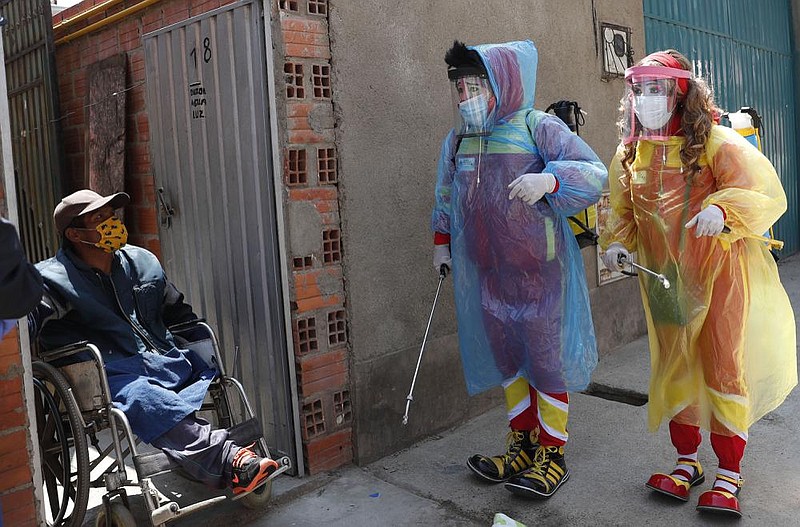BUDAPEST, Hungary -- The number of new confirmed coronavirus cases spiked Friday in parts of eastern Europe, with Hungary and the Czech Republic registering all-time daily highs. Signs of the pandemic's resurgence also were evident in Britain and the Netherlands.
Hungarian Prime Minister Viktor Orban said his government was drafting a "war plan" to defend against the second wave of the pandemic. The plan's aim was "not for everyone to stay at home and bring the country to a halt ... but to defend Hungary's functionality," Orban said.
The prime minister said measures meant to protect the economy and spur growth would be introduced in the coming weeks. In the second quarter of the year, Hungary's gross domestic product fell 13.6%, the worst drop in the region.
Orban reiterated the need to protect the elderly, one of the group's most at-risk during the pandemic, and authorities have banned most visits to retirement homes and hospitals to stem the spread of the virus.
Wearing masks or other face coverings is mandatory on public transportation, in stores and in many public institutions. In Budapest, Hungary's capital city, people not wearing masks on public transit can be fined the equivalent of $26.50.
[CORONAVIRUS: Click here for our complete coverage » arkansasonline.com/coronavirus]
While Hungary closed its borders to foreigners Sept. 1, it has since announced several exemptions, including for people arriving from Poland, the Czech Republic and Slovakia.
"I believe that in the cross-European troubles, we can create a safe central European island, within which and applying particular rules, movement and the possibility of a common life with the Slovaks, Czechs and Poles can survive," Orban said.
Elsewhere around the world:
• Poland registered an increase in new confirmed cases recently, but an overall decline since last month. The government has implemented a strategy that focuses primarily on testing symptomatic patients. People quarantined after contact with an infected person, however, no longer will need to be tested.
• Montenegro, which in June became the first European country to declare itself virus-free, was also registering a spike in new cases, linked to a summer tourist season that saw little distancing at beaches, restaurants and nightclubs.
• Austria announced that it would reimpose stricter measures to curb a rise in new infections, particularly in the capital, Vienna. "Starting Monday face masks will be mandatory again -- in those areas where they are already mandatory right now like in public transport, supermarkets -- but additionally also in shops, services, in government buildings, in schools outside the classroom and in all forms of customer contact," Chancellor Sebastian Kurz said. "If you want to hear a prognosis, I don't expect the situation to improve in the coming weeks," he said. "We can't promise that other measures won't become necessary, too. The goal is to prevent a lockdown."
• In Spain, the top coronavirus expert saw the country's rate of new infections easing and "possibly" reaching a plateau after weeks of sharp increases that brought restrictions across the country. "In recent days, there is a slowdown in this increase and we are possibly seeing a stabilization," said Dr. Fernando Simon, who heads Spain's health emergency coordination center.
• In the U.K., the number of confirmed cases has spiked dramatically over the past week. The Scientific Advisory Group for Emergencies said the virus's transmission rate was likely increasing across the whole country.
• France reported a large jump in new cases, attributed in part to robust testing. President Emmanuel Macron promised to unveil new restrictions, but warned against "ceding to panic." "The virus is circulating widely," he acknowledged, but added that the new measures would be aimed at allowing the French to "live with the virus" -- including keeping children in school.
• India edged closer to recording nearly 100,000 coronavirus cases in 24 hours as it ordered retesting of many people whose first results were from the less-reliable rapid antigen tests being widely used. India has the second-highest caseload behind the United States. The Health Ministry has asked states to allow testing on demand without a doctor's prescription. It also said some negative rapid antigen tests should be redone through the more reliable RT-PCR method.
• South Korea's new coronavirus cases stayed below 200 for a ninth-consecutive day. Health official Yoon Taeho told reporters that the government believes the caseload is on a downward trajectory, though he urged citizens to keep trying to reduce face-to-face contact with others and follow social-distancing guidelines.
• Burma on Friday reimposed its toughest measures so far to control the spread of the coronavirus, banning travel out of the country's biggest city, Yangon, and grounding all domestic flights. An upsurge in coronavirus cases that began in August in the western state of Rakhine has spread to other parts of the country. Until the latest outbreak, Burma appeared to have largely been spared from the pandemic.
Information for this article was contributed by Pablo Gorondi and staff members of The Associated Press.






